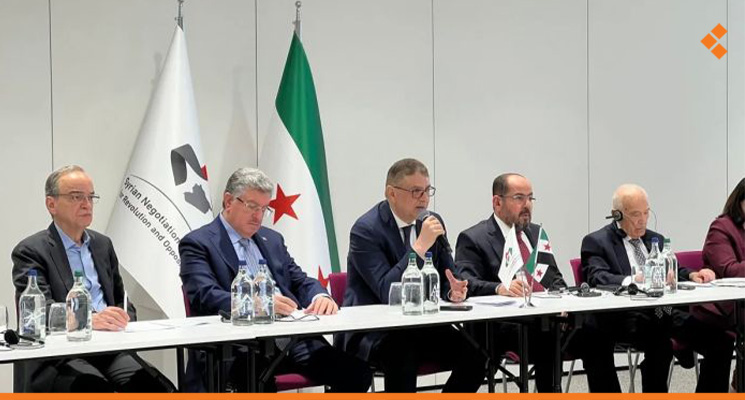Two days ago, the High Negotiations Committee convened a meeting in Geneva where they engaged with American and European envoys. During the meeting, they explicitly stated the objective, emphasizing their intention to “prepare for the next stage” after Syria’s reinstatement to the Arab League and the noticeable thaw in Arab-Damascus relations.
Syrian Opposition Expresses Readiness for Negotiations: No Solution through Normalization
In the final statement issued at the conclusion of the Geneva meeting, the decision to readmit Syria to the Arab League was strongly condemned. The statement underlined the imperative of implementing Resolution 2254 and expressed the negotiating body’s eagerness to resume discussions with the Syrian government. Furthermore, it emphasized the importance of rectifying the political missteps committed by the opposition in recent years, while also demanding the withdrawal of foreign forces from Syria.
The conference took place against a backdrop of dwindling support from several countries that had been backing the Syrian opposition structures. This situation has raised various concerns and provided indications. The British newspaper “The Independent” reported on this meeting, prominently featuring the opposition’s call for the departure of foreign forces from Syria. The report stated, “In an effort to consolidate the perspectives of the diverse platforms, the Syrian opposition convened a meeting with UN envoy to Syria, Geir Pedersen, in Geneva, where they stressed the necessity of foreign forces leaving Syria and preserving stability. They also highlighted that should an international agreement be reached, Damascus would work towards the removal of Turkish and American forces, the two dominant military powers in key agricultural and oil-rich regions.”
The newspaper “Al-Khaleej Online” highlighted that the primary objective of this meeting was to resolve the existing differences among the various factions within the political opposition. It emphasized that the meeting’s foremost aim was to address the implications of Syria’s readmission to the League. Consequently, the frustration experienced by the opposition was evident in its statement, as it called for resuming negotiations with Damascus. The opposition recognized the current international, regional, and Syrian developments as favourable circumstances for negotiations. Moreover, the opposition realized that it was facing strong headwinds, particularly due to the shift in the Arab position resulting from Syria’s return to the League. This shift rendered the opposition incapable of imposing its conditions or achieving favourable outcomes in future negotiations, which has caused dissatisfaction among its ranks.
This meeting takes place following significant developments in the Syrian situation, notably the increasing openness of Arab countries towards Damascus and the activation of the Syrian-Turkish reconciliation process. It is anticipated that the opposition structures will convene two additional meetings in June. The first meeting, titled “Civil Initiative,” will bring together representatives from 150 Syrian civil society organizations. The second meeting, the “Supporting the Future of Syria and the Region” conference, is scheduled to be held in Brussels, Belgium, on June 14th and 15th.
This article was translated and edited by The Syrian Observer. The Syrian Observer has not verified the content of this story. Responsibility for the information and views set out in this article lies entirely with the author.


